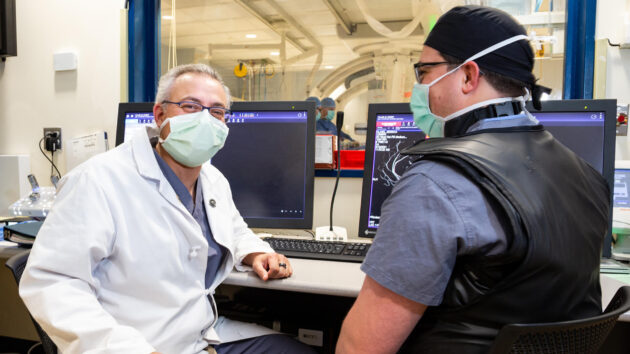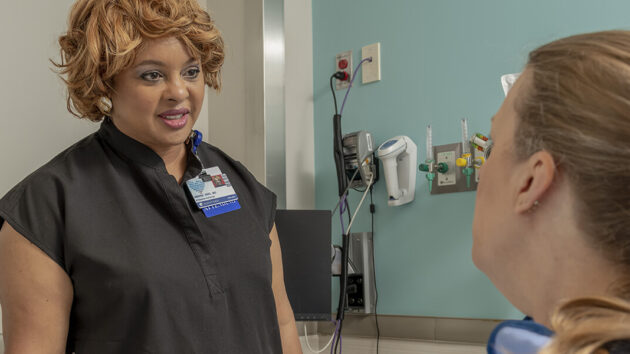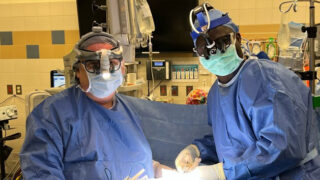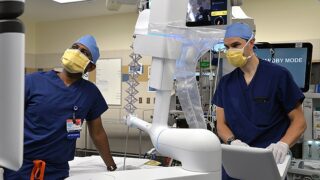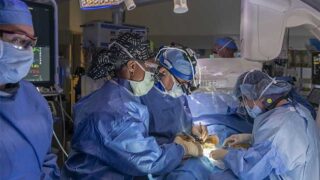Care Throughout the Capital Region
The Albany Med Health System has the most extensive surgical practices in northeastern New York. Surgery is performed at all of our hospitals. Our surgeons work as a team across multiple disciplines. And with the nationally recognized surgical services at Albany Medical Center, patients across the System benefit from the knowledge and experience of the Capital Region's only academic medical center.
To find a surgeon near you, browse our locations. To find a surgeon that fits your particular health needs and find out more about what we offer, browse the list of links below.
Learn more about our surgical services
General Surgery (abdominal organs and the torso)
Surgical Oncology (abdominal and GI tract cancer surgery)
Learn more about pediatric surgery at the Bernard & Millie Duker Children's Hospital.
Surgery in the Albany Med Health System is centered around the patient. For instance, at Albany Medical Center, surgeons offer routine care, and also can tackle the most complex operations necessary befitting a Level 1 Trauma Center as well as routine elective surgical procedures. We have a history of surgical achievements, including successfully performing the region's first robotic gastric bypass surgery and the first artificial spinal disc surgery.
Before and after surgery, patients are cared for by our skilled nursing staff in Pre-Anesthesia and Post-Anesthesia Care Units.
Enhanced Operating Rooms
Albany Medical Center's ORs are designed with patient safety in mind, designed with the assistance of nurses and doctors who actually work there. This includes a highly advanced BrainSuite that enables surgeons to achieve greater precision during brain and spinal surgeries while reducing the threat of infection or recurrence of conditions.
Robotic surgery is lead by surgeons and enhanced with technology that enables surgeons to perform delicate and complex operations through a few small incisions with the assistance of highly technical robotic arms. These robotic procedures most often result in shorter hospital stays, fewer complications, minimized scarring, and faster recovery times. For example, in the treatment of pediatric gallbladder disease, the gallbladder is removed through a very small incision hidden in the belly button.
Among robotic procedures performed by surgeons in the Albany Med Health System:
Ion Robotic-Assisted Bronchoscopy
Albany Medical Center offers this minimally invasive option for earlier detection and treatment of lung cancer. The Intuitive Ion Endoluminal System enables lung specialists to obtain tissue samples from deep within the lung, addressing a challenging aspect of lung biopsy.
Mitral Valve Repair/Replacement
An abnormal or damaged mitral valve cannot completely seal the heart’s left ventricle, resulting in poor blood flow. In some cases, a mitral valve can be repaired with surgery that rebuilds the tissue of the leaky valve with the help of an artificial band. Robotic surgery is performed through a few tiny incisions between the ribs, avoiding the need to split the breastbone and ribcage.
Atrial Septal Defect
An atrial septal defect is a hole in the wall of the atrium, which is the upper chamber of the heart. If left untreated, an atrial septal defect can result in heart failure or stroke. For appropriate patients, robotic repair offers a number of potential benefits over traditional open surgery.
Gastric Bypass Surgery
Weight loss surgery (also known as bariatric surgery) is one of the most effective treatments for obesity. Gastric bypass surgery resizes the stomach limiting the food intake and calorie absorption. It can be performed open or laparoscopically, and, some patients are candidates for robotic gastric bypass surgery.
Cholecystectomy
Robotic surgical removal of the gallbladder is performed through a single incision in the naval.
Hernia Repair
A hernia occurs when part of the internal organ bulges through a weak area of muscle. Hernias are often found in the abdomen or groin and can can be repaired by laparoscopic or robotic surgery.
The Children's Hospital at Albany Medical Center offers robotic surgery to our littlest patients. The most common pediatric robotic surgeries are for the treatment of gallbladder disease and acid reflux.
Robotic Urogynecological Surgery
Hysterectomy
Robotic assisted hysterectomy is the surgical removal of the uterus.
Ovarian Cyst and Tumor Resection
Most ovarian cysts do not require surgery. However, when a cyst grows larger and causes pain, surgery may be recommended.
Pelvic Prolapse (Sacrocolpopexy)
In pelvic prolapse the uterus, cervix, bladder or vagina slip out of position when the muscles and ligaments supporting them lose strength. Pelvic prolapse repair returns the organs to their positions inside the pelvis.
Myomectomy
Removal of uterine fibroids can be performed robotically.
Robotic Assisted Laparoscopic Partial Nephrectomy
This is a less invasive approach to the treatment of kidney cancers (renal cell carcinoma).
Robotic Assisted Prostatectomy
This is a less invasive approach to prostate removal.
Cystectomy
Robotic assisted cystectomy is a less invasive approach to the removal of the bladder and treatment of bladder cancer.
Other robotic surgeries performed at the Albany Med Health System:
- Sympathectomy (destruction of nerves)
- Nephroureterectomy (removal of a kidney and its ureter)
- Hemicolectomy (partial colon removal)
- Pyeloplasty (reconstruction of the kidney pelvis)
More often than not, our surgeons recommend minimally invasive or laparoscopic surgery, including robotic surgery, which can result in smaller incisions, less pain, fewer complications, and a shorter hospital stay.
Many patients have a minimally invasive surgery option for these procedures:
- Gastric bypass (lap-banding)
- Coronary artery bypass grafting (CABG)
- Valve surgery
- Transcatheter aortic valve replacement (TAVR)
- Hernia repair
- Anti-reflux operations for GERD and hiatal hernia
- Appendix removal
- Surgery for cancer of the stomach, gallbladder, liver, and pancreas
- Gallbladder surgery
- Colon and rectal surgery
Parathyroidectomy
Gynecological and Urogynecological Surgery
- Hysterectomy
- Surgery to treat incontinence and pelvic pain
- Surgery to treat pelvic organ prolapse
- Ovarian cyst and tumor removal
- Nissen fundoplication
- Heller myotomy
- Esophagectomy
- Video-assisted thoracoscopic surgery (VATS) lobectomy
- Video-assisted thoracoscopic surgery (VATS) thymectomy
- Kidney and prostate surgery


